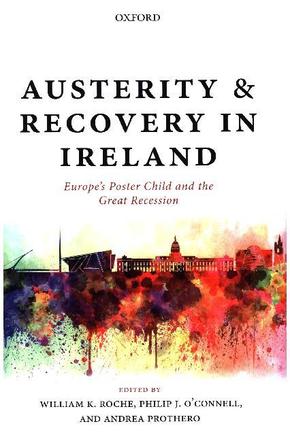
Austerity and Recovery in Ireland - Europe's Poster Child and the Great Recession
| Verlag | Oxford University Press |
| Auflage | 2016 |
| Seiten | 370 |
| Format | 18,4 x 24,5 x 2,3 cm |
| Print PDF | |
| Gewicht | 666 g |
| Artikeltyp | Englisches Buch |
| ISBN-10 | 0198792379 |
| EAN | 9780198792376 |
| Bestell-Nr | 19879237EA |
This book presents a systematic analysis of the Great Recession, austerity, and subsequent recovery in Ireland. It discusses the extent to which the Irish response to the recession led to significant changes in economic policy and in business, work, consumption, the labour market, and society.
In international commentary and debate on the effects of the Great Recession and austerity, Ireland has been hailed as the poster child for economic recovery and regeneration out of deep economic and fiscal contraction. While the genesis of Ireland's financial, economic and fiscal crisis has been covered in the literature, no systematic analysis has yet been devoted to the period of austerity, to the impact of austerity on institutions and people, or to the roots of economic recovery.
In this book a group of Ireland's leading social scientists present a multi-disciplinary analysis of recession and austerity and their effects on economic, business, political and social life. Individual chapters discuss the fiscal and economic policies implemented, the role of international, and, in particular, of EU institutions, and the effects on businesses, consumption, work, the labour market, migration, political and financial institutions, social inequality and cohesion, housing and cu ltural expression.
The book shows that Ireland cannot be viewed uncritically as a poster child for austerity. While fiscal contraction provided a basis for stabilizing the perilous finances of the State, economic recovery was due in the main to the long-established structure of Irish economic and business activity, to the importance of foreign direct investment and the dynamic export sector, and to recovery in the international economy. The restructuring and recovery of the financial system was aided by favourable international developments, including historically low interest rates and quantitative easing. Migration flows, nominal wage stability, the protection of social transfer payments and the involvement of trade unions in severe public sector retrenchment - long-established features of Irish political economy - were of critical importance in the maintenance of social cohesion.
Inhaltsverzeichnis:
1: William K. Roche, Philip O'connell, and Andrea Prothero: 'Poster Child' or 'Beautiful Freak': Austerity and Recovery in Ireland
2: Seán Ó Riain: The Road to Austerity
3: Stephen Kinsella: Economic and Fiscal Policy
4: Frank Barry and Adele Bergin: Business
5: Gregory Connor, Thomas Flavin, and Brian O'Kelly: The Financial Sector
6: Blanaid Clarke: Banking Regulation
7: Marius Claudy, Andrew Keating, and Andrea Prothero: Consumption
8: Paul Teague: Ireland and the 'GIPS' Countries
9: David M. Farrell: Political Reform
10: Brigid Laffan: International Actors and Agencies
11: William K. Roche: Workplaces
12: Richard Boyle: Public Service Reform
13: Philip J. O'Connell: Unemployment and Labour Market Policy
14: Kathleen Lynch, Sarah Cantillon, and Margaret Crean: Inequality
15: Rob Kitchin, Rory Hearne, and Cian O'Callaghan: Housing
16: Irial Glynn and Philip J. O'Connell: Migration
17: Donald Taylor Black: Culture
Rezension:
The many strands of ruin and gradual but not complete recovery are dealt with in a style that is both scholarly and accessible. This richness makes it the best overall single-volume assessment of our recent political and social experience. Paschal Donohoe, Minister for Public Expenditure and Reform, The Irish Times
